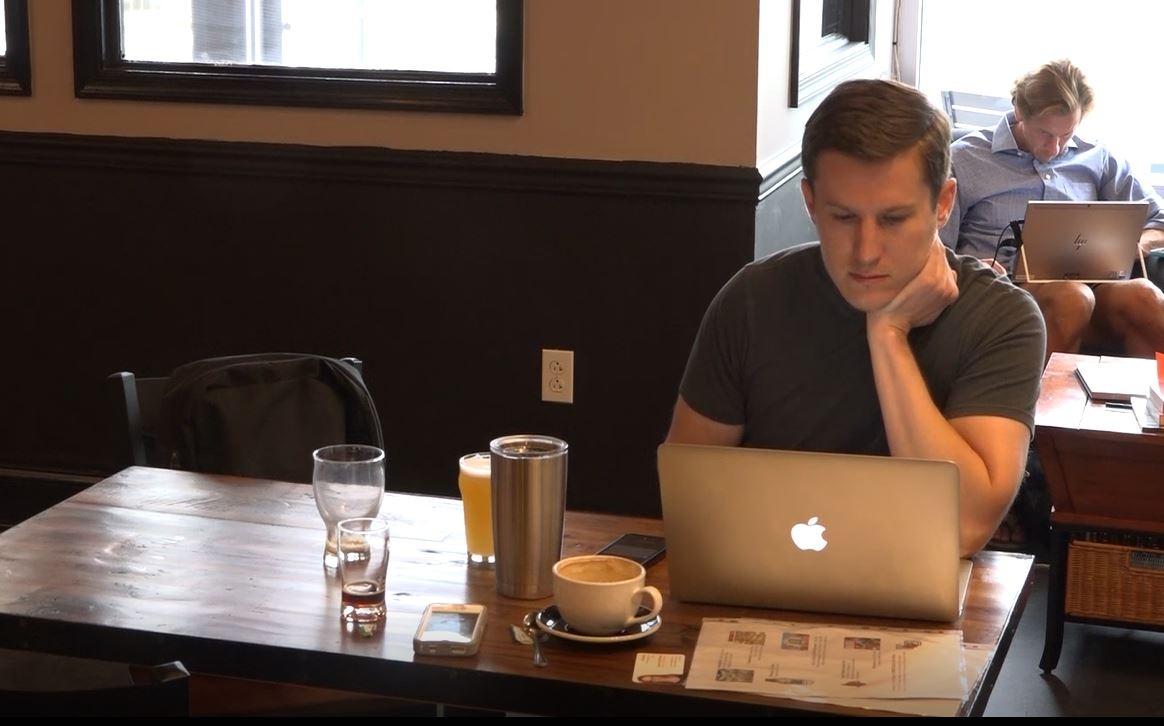DRESHER, Pa. (WLVT) - Jonathan Mercer’s office wasn’t in a specific building. It was wherever he sat down that day.“I was living in Doylestown and was actually running a project based out of Australia because I had lived there prior and was working from home,” Mercer said.In 2016, Mercer was part of a growing trend: people working remotely. Forty-three percent of U.S. employees now
work remotely at least part of the time, according to Gallup’s
State of the American Workplace report.
More than half of workers will are expected to do some freelancing by 2027.
“There’s the gig economy now. So a lot of folks that don’t want to work for the same company for their entire lives, and the internet allows you to do that, which is great,” Mercer said.
Millennials make up the largest remote workforce.
Forty-two percent of people 18 to 34 did some remote work in 2018, according to freelancing website Upwork.
“I don’t know if it’s necessarily because millennials are any different than their parents were, but I think it’s more just the environment that we’re in now and the resources that we have are different,” Mercer said.
Some studies suggest working remotely is more productive than working in an office. One study by Stanford University found
remote workers are so productive they get an extra day of work done per week.
“A lot of people when they first try are a coworking space or working from a pop-up like this, they’ll feel unproductive at first because they’re excited to be around people, so they’ll be talking a lot, they’ll be distracted by all the movement,” Mercer said. “But then once you get into it, your productivity really shoots up.”
Mercer said remote working also has personal benefits, like a more flexible schedule. At first he liked working from home, but he was also dealing with some of the problems that come with it. “You really lose the community that you do have from an office,” he said. “And you really lose routine too, which is important. I would wake up at 8 o’clock, 8:30 and roll out of bed and just start working. Then it would be 12:30, 1 o’clock and I hadn’t eaten yet. I hadn’t showered. I hadn’t gotten dressed. You just don’t feel right, and you’re taking calls in that state.”
Mercer decided he needed to get out of house. So he began organizing weekly pop-up coworking events at a coffee shop in Doylestown. Groups of 10 to 15 people would show up, he said.
“I realized there might be a need for a space for this, a dedicated coworking space,” Mercer said.
So he continued the pop-up coworking events. This summer, they’re happening Tuesdays at Track3 Microbrewery and Coffeehouse in Dresher.
Many remote workers are used to spending entire days in coffee shops, which have become a go-to spot to get work done.
“Getting out of the house and putting on the backpack and going to the coffeeshop makes me feel like I’m in work mode,” said Justin Copenhaver, remote worker and founder of travel marketing platform
Urality. “If I were to roll out of bed and just open a laptop, I wouldn’t feel like I’m in that work mode, which is why I force myself out of the house most days.”
“I’d be at home, isolated in my basement, going a little bit crazy,” said Patti Dalessio, a remote worker and owner of online marketing company
Reinvent Interactive. “I kind of need that extra sound around me, other people.. I find it energizing and I’m actually more productive.”
Coffee shops often have the resources remote workers need.
“Honestly, wifi is number one,” Copenhaver said. “Outlets are important, but I typically try to keep my laptop charged. For me, coffee is a thing that I always go for.”
But coffee shop owners aren’t always thrilled to host remote workers.
“You’re worried about people hanging out here all day long and only purchasing a small amount of coffee or food and using the wifi all day,” said Joe Burdo, owner and head brewer at Track3. “But for the most part it’s good for the business. It’s extra marketing for us. So I think in general it’s a positive for most coffee shops.”
Plus, working in a public place has its own drawbacks.
“There’s a lot of folks who work from home. They’ll go to Starbucks or a coffee shop, but you’re still alone because you’re not necessarily interacting with anyone other than the barista or server,” Mercer said. “But here it’s kind of an open invite to talk to the person you’re sitting next to with a laptop.”
“I did try it for a while on my own, just going out to a Starbucks, setting up wherever they had wifi, but I think having a dedicated coworking space, making those relationships, and even making business relationships,” Dalessio said. “I can actually find clients that way and partner up with other coworking businesses.”
Mercer now owns a permanent coworking space,
Stacks Co. in Doylestown.
But he and others still see the value in hosting free events for remote workers, even if they don’t rent space at Stacks.
“This has actually been a lot of fun,” Dalessio said.
Mercer is already organizing the next pop-up in Newtown this fall, at a to-be-announced coffee shop.




